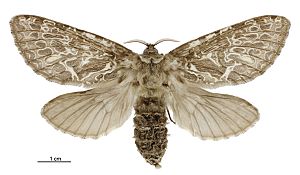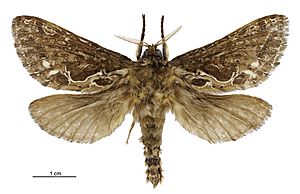Forest ghost moth facts for kids
Quick facts for kids Forest ghost moth |
|
|---|---|
 |
|
| Female specimen | |
 |
|
| Male specimen | |
| Scientific classification | |
| Synonyms | |
|
The Aoraia enysii, also known as the forest ghost moth, is a type of moth. It belongs to a group of moths called the Hepialidae family. This special moth lives only in New Zealand, meaning it is endemic there. It is the only species from its group, called Aoraia, that you can find on both the North Island and the South Island of New Zealand.
This moth was first described by a scientist named Arthur Gardiner Butler in 1877. He studied a specimen, which is a sample of the animal, that was found on the North Island by J. D. Enys.
Contents
About the Forest Ghost Moth
Size and Appearance
The forest ghost moth has a unique look. Its wingspan, which is the distance from one wingtip to the other when the wings are spread out, varies depending on if it's a male or a female.
- Male moths usually have a wingspan of about 60 to 74 millimeters (about 2.4 to 2.9 inches).
- Female moths are larger, with a wingspan of about 78 to 110 millimeters (about 3.1 to 4.3 inches).
The front wings of the moth have a detailed pattern. They are made up of different shades of brown. You might also see ash-white marks and sometimes patches of yellowish scales near the edges. The back wings are usually yellowish-brown, fawn, or smoky in color.
When They Fly
Adult forest ghost moths are usually seen flying between February and May. This is when they are "on wing," meaning they have completed their growth and are flying around.
Where They Live and What They Eat
The young moths, called larvae, live on the forest floor. You can find them in small holes or hidden among the fallen leaves and other plant material. These larvae are important because they help clean up the forest by eating leaf litter.

